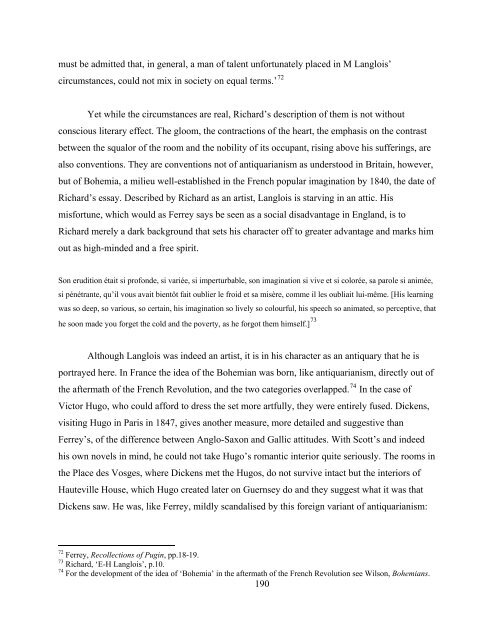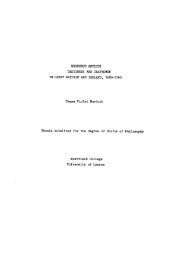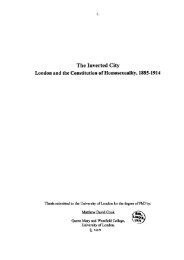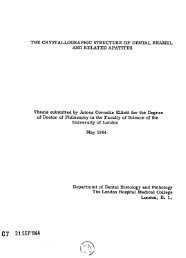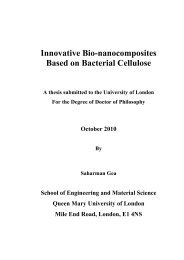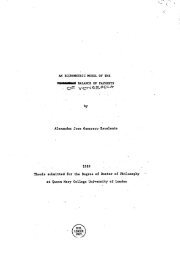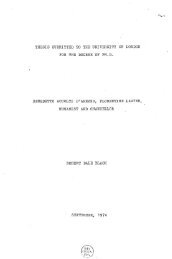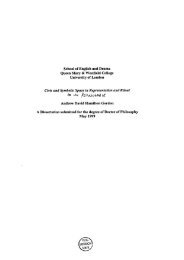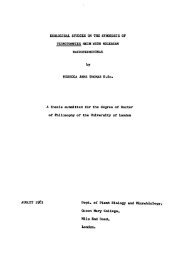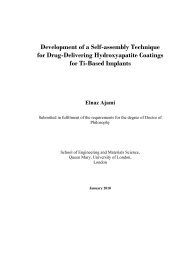Antiquaries in the Age of Romanticism: 1789-1851 - Queen Mary ...
Antiquaries in the Age of Romanticism: 1789-1851 - Queen Mary ...
Antiquaries in the Age of Romanticism: 1789-1851 - Queen Mary ...
You also want an ePaper? Increase the reach of your titles
YUMPU automatically turns print PDFs into web optimized ePapers that Google loves.
must be admitted that, <strong>in</strong> general, a man <strong>of</strong> talent unfortunately placed <strong>in</strong> M Langlois’<br />
circumstances, could not mix <strong>in</strong> society on equal terms.’ 72<br />
Yet while <strong>the</strong> circumstances are real, Richard’s description <strong>of</strong> <strong>the</strong>m is not without<br />
conscious literary effect. The gloom, <strong>the</strong> contractions <strong>of</strong> <strong>the</strong> heart, <strong>the</strong> emphasis on <strong>the</strong> contrast<br />
between <strong>the</strong> squalor <strong>of</strong> <strong>the</strong> room and <strong>the</strong> nobility <strong>of</strong> its occupant, ris<strong>in</strong>g above his suffer<strong>in</strong>gs, are<br />
also conventions. They are conventions not <strong>of</strong> antiquarianism as understood <strong>in</strong> Brita<strong>in</strong>, however,<br />
but <strong>of</strong> Bohemia, a milieu well-established <strong>in</strong> <strong>the</strong> French popular imag<strong>in</strong>ation by 1840, <strong>the</strong> date <strong>of</strong><br />
Richard’s essay. Described by Richard as an artist, Langlois is starv<strong>in</strong>g <strong>in</strong> an attic. His<br />
misfortune, which would as Ferrey says be seen as a social disadvantage <strong>in</strong> England, is to<br />
Richard merely a dark background that sets his character <strong>of</strong>f to greater advantage and marks him<br />
out as high-m<strong>in</strong>ded and a free spirit.<br />
Son erudition était si pr<strong>of</strong>onde, si variée, si imperturbable, son imag<strong>in</strong>ation si vive et si colorée, sa parole si animée,<br />
si pénétrante, qu’il vous avait bientôt fait oublier le froid et sa misère, comme il les oubliait lui-même. [His learn<strong>in</strong>g<br />
was so deep, so various, so certa<strong>in</strong>, his imag<strong>in</strong>ation so lively so colourful, his speech so animated, so perceptive, that<br />
he soon made you forget <strong>the</strong> cold and <strong>the</strong> poverty, as he forgot <strong>the</strong>m himself.] 73<br />
Although Langlois was <strong>in</strong>deed an artist, it is <strong>in</strong> his character as an antiquary that he is<br />
portrayed here. In France <strong>the</strong> idea <strong>of</strong> <strong>the</strong> Bohemian was born, like antiquarianism, directly out <strong>of</strong><br />
<strong>the</strong> aftermath <strong>of</strong> <strong>the</strong> French Revolution, and <strong>the</strong> two categories overlapped. 74 In <strong>the</strong> case <strong>of</strong><br />
Victor Hugo, who could afford to dress <strong>the</strong> set more artfully, <strong>the</strong>y were entirely fused. Dickens,<br />
visit<strong>in</strong>g Hugo <strong>in</strong> Paris <strong>in</strong> 1847, gives ano<strong>the</strong>r measure, more detailed and suggestive than<br />
Ferrey’s, <strong>of</strong> <strong>the</strong> difference between Anglo-Saxon and Gallic attitudes. With Scott’s and <strong>in</strong>deed<br />
his own novels <strong>in</strong> m<strong>in</strong>d, he could not take Hugo’s romantic <strong>in</strong>terior quite seriously. The rooms <strong>in</strong><br />
<strong>the</strong> Place des Vosges, where Dickens met <strong>the</strong> Hugos, do not survive <strong>in</strong>tact but <strong>the</strong> <strong>in</strong>teriors <strong>of</strong><br />
Hauteville House, which Hugo created later on Guernsey do and <strong>the</strong>y suggest what it was that<br />
Dickens saw. He was, like Ferrey, mildly scandalised by this foreign variant <strong>of</strong> antiquarianism:<br />
72<br />
Ferrey, Recollections <strong>of</strong> Pug<strong>in</strong>, pp.18-19.<br />
73<br />
Richard, ‘E-H Langlois’, p.10.<br />
74<br />
For <strong>the</strong> development <strong>of</strong> <strong>the</strong> idea <strong>of</strong> ‘Bohemia’ <strong>in</strong> <strong>the</strong> aftermath <strong>of</strong> <strong>the</strong> French Revolution see Wilson, Bohemians.<br />
190


